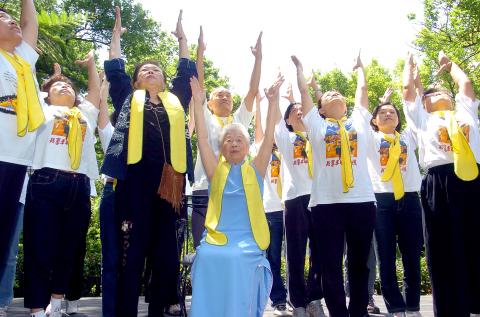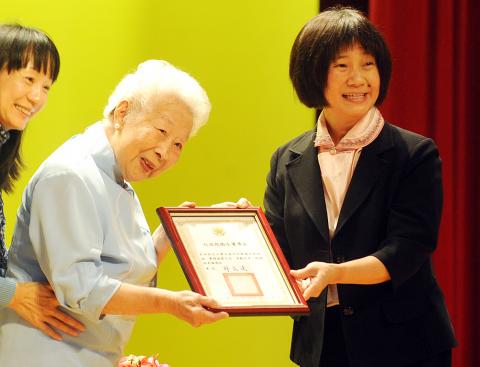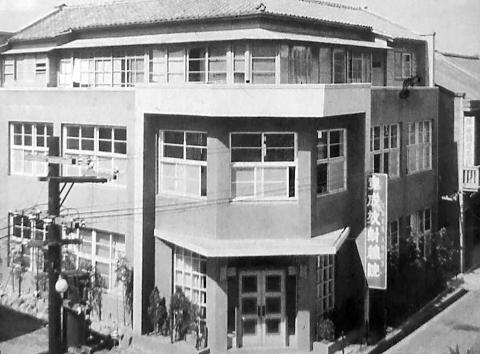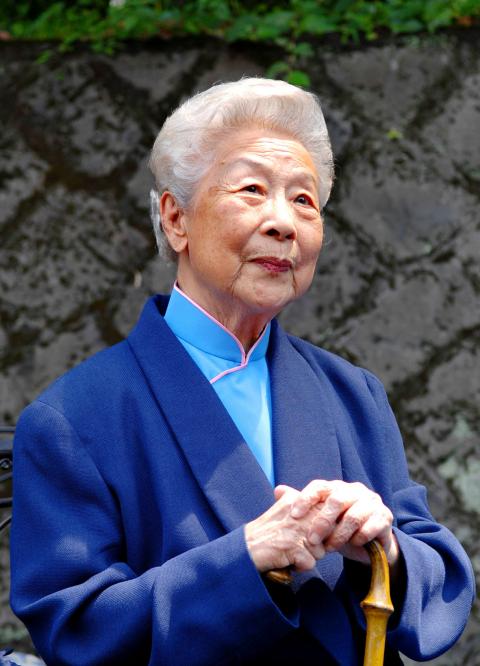Feb. 4 to Feb. 10
As a female, Chuang Shu-chi (莊淑旂) was not supposed to follow her father’s footsteps in practicing traditional Chinese medicine.
Her father desperately wanted a son, but her mother was unable to have any more children after a miscarriage. The family later adopted two boys, and Chuang was deeply affected when she heard her father lament that she would only grow up to be part of someone else’s family.

Photo: Lu Chun-wei, Taipei Times
Chuang says in her biography by historian Hsu Hsueh-chi (許雪姬) that in order to prove that she could help her father, she started secretly studying medicine and learning folk remedies from visitors. So when her father’s assistant suddenly died, a 12-year-old Chuang knew exactly what to do.
That night, Chuang gathered her stepbrothers and correctly prepared the ingredients needed for her father’s tasks the next day. Her surprised father pulled her out of school and started training her at the shop, launching the career of Taiwan’s first licensed female Chinese medicine doctor.
Chuang practiced in Taiwan for only a few years before she fled to Japan, where she gained fame becoming a medical consultant to the imperial family. She returned to Taiwan in 1988 and by the time she died on Feb. 4, 2015, she had gained fame as the “godmother of cancer prevention” and known for tirelessly promoting her “Cancer Prevention Universal Exercise” (防癌宇宙操), a six-minute-per-day routine that she says helps empty stomach gas and promotes circulation and natural energy absorption.

Photo: Tsung Chang-chin, Taipei Times
‘LADY DOCTOR’
It was rare for women to work at medicine shops, but Chuang’s appearance unexpectedly gave the family business a huge boost.
“I was not a beauty, but many believed that if they took medicine prepared by an unmarried girl, their symptoms would alleviate quicker … People even came back to present me with red envelopes and gifts after they got better. The news of a doctor’s daughter who helped prepare medicine quickly spread.”

Photo courtesy of Wikimedia Commons
Chuang’s skills greatly improved under her father’s strict tutelage. When she was about 14, one of her nephews fell ill with fever and pneumonia. The local pediatrician pronounced him incurable and told the family to leave him to die, but Chuang managed to nurse him back to health. Armed with newfound confidence, Chuang writes that she managed to save two more children before she turned 16.
Chuang’s father died of rectal cancer when she was 19. She had gotten married a year previously — World War II was intensifying and her parents hastily found her a husband to avoid being forced by the Japanese into sexual slavery as a comfort woman. Her father was deep in debt when he died, but Chuang and her brothers kept the clinic running.
Her husband also soon died of cancer in 1945, leaving Chuang and five children to fend for themselves. One afternoon in 1950, a family friend visited Chuang and casually asked if she was taking the government exams for Chinese medicine practitioners.

Photo: Lu Chun-wei, Taipei Times
“I had no idea it was going on. That was the last day to register, and I rushed to the registration office only to find out that it required documents that would likely take a whole day to prepare,” she says.
Fortunately, the registration staff allowed her to turn in the documents late. She was too busy to study, but luckily she already knew the material through years of practice.
On Jan. 17, 1951, Chuang became a licensed practitioner. People stopped calling her by her childhood nickname of “Shorty Chi” (矮仔旂) and started referring to her as “Lady Doctor” (查某先生). She also opened the Chingcheng Radiology Clinic (竟成放射線院) to help ease traffic at National Taiwan University hospital, which was often packed as the only institution in Taiwan to have radiology equipment.
FLIGHT TO JAPAN
Business was booming, but the good times wouldn’t last. Chuang’s clinic had a side business purchasing Angelica sinensis (當歸) from Hong Kong for the state-run Taiwan Tobacco and Wine Monopoly Bureau (菸酒公賣局) to produce medicinal wine. However, this violated the wartime and Martial Law era National General Mobilization Law (國家總動員法), which limited the amount of imports one could have to prevent hoarding.
Chuang was arrested by the military police, who held her for 20 days before informing her of her charges. Although she had the documents from the Tobacco and Wine Monopoly Bureau to prove her innocence, the military court sentenced her to three years anyway, causing a furious Chuang to collapse in court from an ulcer. She avoided jail time to treat her illness, but a military court official surnamed Lee (李) frequently blackmailed Chuang’s family for money, threatening to send her back to jail otherwise.
Chuang already had plans to head to Japan to study how to relieve the pain of terminal cancer patients, but now she had to flee Taiwan to avoid further trouble. With the help of a patient who happened to be the father-in-law of Chiang Wei-kuo (蔣緯國), then-president Chiang Kai-shek’s (蔣介石) adopted son, she obtained permission to treat her ulcer in Japan.
With her eldest daughter in tow, Chuang set off in May 1954. Meanwhile, Lee was arrested for blackmailing another woman in the same manner, and was sentenced to death. Chuang remained in Japan for the next three decades, earning her PhD in 1966 and becoming a Japanese household name for serving as medical consultant for Empress Michiko and later the entire imperial family.
Chuang finally returned to Taiwan in 1988, where she continued her work in cancer prevention and treatment. While she announced her retirement in 2009 at the age of 90, she still made a public appearance that year, leading more than 1,000 people in performing her signature exercises in front of Taipei City Hall.
Taiwan in Time, a column about Taiwan’s history that is published every Sunday, spotlights important or interesting events around the nation that have anniversaries this week.

A vaccine to fight dementia? It turns out there may already be one — shots that prevent painful shingles also appear to protect aging brains. A new study found shingles vaccination cut older adults’ risk of developing dementia over the next seven years by 20 percent. The research, published Wednesday in the journal Nature, is part of growing understanding about how many factors influence brain health as we age — and what we can do about it. “It’s a very robust finding,” said lead researcher Pascal Geldsetzer of Stanford University. And “women seem to benefit more,” important as they’re at higher risk of

Last week the Democratic Progressive Party (DPP) said that the budget cuts voted for by the China-aligned parties in the legislature, are intended to force the DPP to hike electricity rates. The public would then blame it for the rate hike. It’s fairly clear that the first part of that is correct. Slashing the budget of state-run Taiwan Power Co (Taipower, 台電) is a move intended to cause discontent with the DPP when electricity rates go up. Taipower’s debt, NT$422.9 billion (US$12.78 billion), is one of the numerous permanent crises created by the nation’s construction-industrial state and the developmentalist mentality it

Experts say that the devastating earthquake in Myanmar on Friday was likely the strongest to hit the country in decades, with disaster modeling suggesting thousands could be dead. Automatic assessments from the US Geological Survey (USGS) said the shallow 7.7-magnitude quake northwest of the central Myanmar city of Sagaing triggered a red alert for shaking-related fatalities and economic losses. “High casualties and extensive damage are probable and the disaster is likely widespread,” it said, locating the epicentre near the central Myanmar city of Mandalay, home to more than a million people. Myanmar’s ruling junta said on Saturday morning that the number killed had

Mother Nature gives and Mother Nature takes away. When it comes to scenic beauty, Hualien was dealt a winning hand. But one year ago today, a 7.2-magnitude earthquake wrecked the county’s number-one tourist attraction, Taroko Gorge in Taroko National Park. Then, in the second half of last year, two typhoons inflicted further damage and disruption. Not surprisingly, for Hualien’s tourist-focused businesses, the twelve months since the earthquake have been more than dismal. Among those who experienced a precipitous drop in customer count are Sofia Chiu (邱心怡) and Monica Lin (林宸伶), co-founders of Karenko Kitchen, which they describe as a space where they